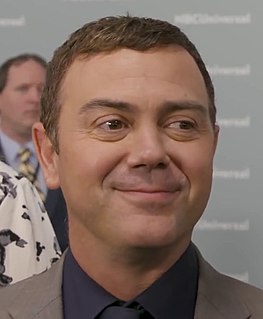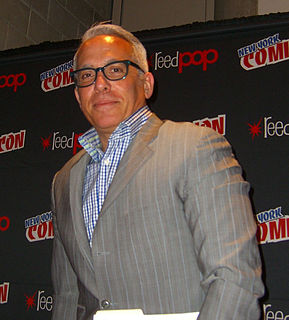A Quote by Douglas Adams
Because the Internet is so new, we still don't really understand what it is. We mistake it for a type of publishing or broadcasting, because that's what we're used to. So people complain that there's a lot of rubbish online, or that it's dominated by Americans, or that you can't necessarily trust what you read on the Web.
Related Quotes
With the communication internet, whole industries have been disrupted. You're in the publishing industry, you understand that. Before, we had newspapers, magazines - now you're on the web. I'm in book publishing. I don't have to tell you what's happened to us. Television has taken a hit. The music industry. But, thousands of new businesses have emerged on this new communication revolution platform. Not just Google, Facebook, and Twitter. There are thousands of operations. Businesses that are doing the platforms, the apps. They're mining the big data. They're creating the connections.
The reality of television production now is that all the development money and pilot money now goes to the Internet so they can try to get pilots cheaper, than if they were producing them for television. I understand, it's a business, but what's great about doing it on the web, and one thing that attracted me is the amount of creative freedom that you do get with the web. That's the only advantage of there not being a lot of money involved, is that you're really able to write and do what you want... because there's not a lot of money involved and not money at risk.
I hate to think of a day where a compelling book or a compelling authorial voice would be lost simply because that person doesn't have a Web site. But I think that, to use the Internet in a positive way, to turn people on to reading, is something that authors shouldn't really shy away from necessarily.
In a lot of ways, L.A. has always been kind of colonized or marginalized by New York. It still goes on to this day, but I would add that it really feeds New York because it provides artists for that system. This is really a laboratory where they grow the seeds and they go there and blossom because there's still not a lot of support in L.A. for artists.
One thing is funny because my grandparents are going to come see the show and my mom was concerned that they wouldn't understand, because so much of it is Internet-based. Our generation specifically really relates to it, because we were the first people to discover the Internet and most of us can maybe navigate the Internet better than our parents can. All this information you could ever possibly know is right at our fingertips, not to mention the fact you can meet anyone!
Stop looking at the Web as merely a display opportunity and not a way to interact. That does not create a new business model, it just shifts one that isn't growing and is outdated. The reason sites like Google are stealing advertisers from daily newspapers is not because Google has more eyeballs. It's because Google used the interactivity of the Web to deliver a new, better way to advertise.
My venture investing career has three phases, all roughly 6-8 years long. The first, at Euclid, was software to Internet. The second, at Flatiron, was Internet to bubble. And the third, at USV, has been web 2 to mobile. I have always used a new firm to denote a new investment phase for me. Throw away the old. Start with the new.
I think Memento movie was hard because people didn't get it, they just didn't understand it. Not from the stage when we read the script and liked it. It's sort of a famous story now how we finished the movie and showed it to distributors and nobody wanted it. So it wasn't just they didn't get the script, they really didn't even understand the movie when it was done. But I think that was a particularly hard one. I don't think it was harder because we were girls, but I do think obviously there are particular challenges to working in a male-dominated industry.
Having access to mobile phones and being able to document your own life brings people together. Technology has a lot to do with how the world is developing at the moment because there are very raw and pure and primal emotions that people are communicating to each other over the Internet. It's like our new feathers, our new face paint. We're still trying to find love and friendship and cool music, but now it's over the Internet.






































